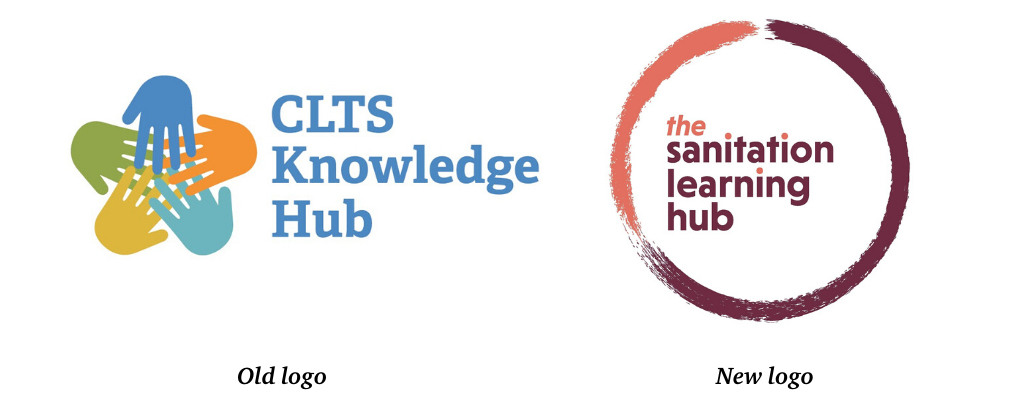You may have noticed that the CLTS Knowledge Hub has started calling itself the Sanitation Learning Hub. Why is this?
With recently renewed funding from the Swedish International Development Cooperation Agency (Sida), we renamed the organisation to better reflect our now broader approach to learning within the sector.
Along with this, we updated our logo and are currently building new communications platforms; this includes the launch of a new website in April/May 2020.

The new site will provide the sanitation and hygiene sector with access to:
- Curated quality research and learning
- Practical guidance
- Space to share successes, failures and innovations!
In the meantime, we wanted to give you an overview of what the new Hub is about and how you can get involved.
How is the Hub helping?
For over ten years, the Sanitation Learning Hub has been supporting learning and sharing across the international sanitation and hygiene sector, using innovative participatory approaches to engage with both practitioners, policy makers and the communities they wish to serve.
Over the next decade, we aim to continue this work supporting and strengthening the sector in tackling the complex challenge of ensuring safely-managed sanitation and hygiene for all. We know that our timely, relevant and actionable research and learning will play a key role in tackling that challenge.
Our vision is that everyone has the right to safely managed sanitation and hygiene – making sure no one is left behind in the drive to end open defecation for good.
What is our mission, approach and niche?
We aim to enable the sector to innovate, adapt and collaborate in a rapidly evolving landscape, feeding learning into policies and practice.
Our approach cuts across organisational and geographical barriers, encouraging honest reflections of what works and what does not outside of people’s usual silos.
Key elements of our approach include:
- Supporting learning through sharing good practices, methodologies and innovations in programming and policy.
- Innovating and testing action-orientated approaches providing timely and relevant evidence and insight which can support the sector to quickly adapt to meet the diverse needs of varying contexts.
- Promoting participatory learning and research capturing field level realities and community perspectives.
- Drawing attention to knowledge gaps, blind spots and emerging questions to ensure that no key issues are overlooked, and no one is left behind.
- Collaborating – we work with global partners, governments and practitioners from across the sector.
- Creating safe exploration spaces leads to valuable connections, insights and concrete steps forward.
In such a diverse and challenging sector, it’s more vital than ever to use the spaces the Hub creates for reflection and to encourage the co-generation of answers to emerging questions for good quality practice. Our team is sensitive, agile and able to adapt quickly to emerging priorities, identify gaps and expose what is being overlooked.
We build on over a decade of work and the longstanding trust and relationships that have developed over this time. Partners and contacts have routinely welcomed our ability to reflect on, digest and disseminate information coming from different organisations and countries.
What issues do we prioritise?
We can see that the sector faces a long list of unknowns and challenges, as well as areas of opportunity.
There are key areas where rapid and realistic learning about unknowns, innovations and experiences, and the incorporation of lessons into policy and practice, could be very valuable.
They are also potentially mutually strengthening: learning and action on one will benefit the others. These are not set in stone – and the agility of the Hub enables us to adapt and change as new challenges and questions emerge. Some priority themes for the coming years are:
- Leaving no one behind – effective policies, guidelines and programme processes that support the poorest, most marginalised and hardest to reach in achieving S&H services.
- Gender transformative programming – further exploring how S&H programming and processes can be strengthened to promote transformative change in gender inequality within households, communities and within S&H programming and policy.
- Safely managed sanitation and environmental cleanliness – how to ensure higher levels of service provision, safe disposal of faeces, safe handwashing practices and management of animal faeces.
- Sustainability, partial usage and slippage – support the rapid identification and sharing of new practices to address slippage and sustainability challenges being faced.
How can you get involved?
The new website will have spaces for sharing your innovations, experiences and research.
If you would like to meet us in person – it will also give you information on attending workshops and events we will be co-hosting and/or presenting at.
But in the meantime, if you’d like to keep updated about the Hub’s developments and receive monthly newsletters on key sanitation and hygiene themes – please sign up to receive our monthly newsletter. (You can read previous issues here).
Follow us on social media
You can also write to me with resource and blog submissions, by emailing me at [email protected].